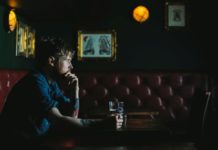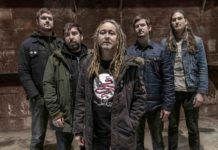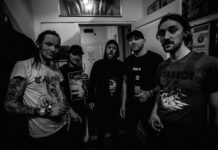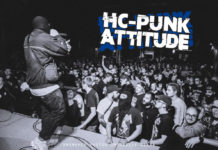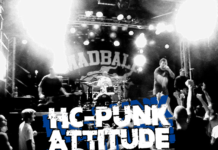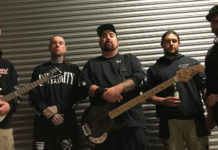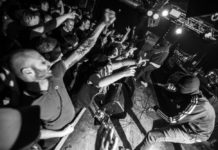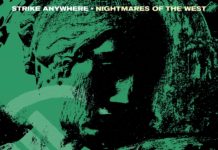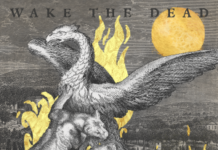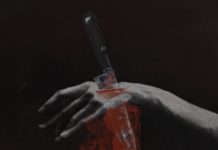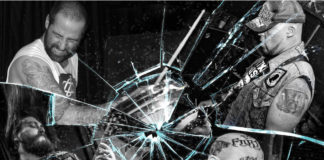AFL: You said in an interview 2005 that little stages are great and you like concerts in rockclubs with 200 peoples. Now you’re selling out even bigger clubs. Could you ever imagine that this will happen to you as a band?
Cecilia: I mean yes, because i would say our crowd was always very happy to go to our lifeshows. So its just a matter who knows us. And i mean 2005, we started out just a couple of years ago, so then we didnt have that big of a crowd. But to make liveshows is our main thing, or have to say we do it a lot and we really like it and people enjoy it. So yes, i would say we were prepared for getting a big crowd – or bigger crowd.
AFL: You were touring with Die Toten Hosen last year, how did that happen? Did they invide you?
Cecilia: Yeah they invited us and we are super happy about it, of course. They are very nice people, the shows were super and we had a lot of fun. It was great to do such big venues and it’s another thing than to do clubshows, of course.
AFL: Could you still feel the connection to the fans on such big stages?
Cecilia: I think we still feel the connection, yes. But it’s a different thing of course, because your not that close to the crowd. You just have to work it in another way, we have to say. And of course mainly at the Toten Hosen show it’s the Tote Hosen fans, so its not like our fans. But i guess we also have fans at the Toten Hosen crowds. I don’t know, what do you guys say? (asking her band)
Håkan: Yeah, nothing more to say.
AFL: If you’d have to choose, would you prefer to play on bigger or on smaller stages?
Cecilia: Um, I don’t think that we have to choose, so we want to do both.
AFL: That’s good. So you will keep playing small shows, even if you could fill big stadiums?
Cecilia: Yes!
Frida: Everyone of us wants to keep the feeling that you have when you stand face to face with the fans, feeling the sweat of the fans and doing the show together.
AFL: A lot of bands should take you as an example. Past the last years, you were touring as much as hardly any other band. Was that the key to your success?
Cecilia: Yeah i mean of course that helps spreading the name and the music.
Håkan: But there’s some other stuff: good songs, good performance, some support of the Toten Hosen and Broilers. It’s all together.
Cecilia: Yes.
Håkan: We don’t have any hit songs on the radio, so yeah …
Cecilia: I guess if we weren’t a good live act, then it wouldn’t have been that interesting. So its a combination of all.
AFL: The next question is about your new album „Radio Rebelde“. How do you think that the songs and music evolve?
Cecilia. I guess if you go to our first records, that’s much more pure punk. I mean hard and fast songs. We always worked with a lot of melodies and we still have that. But now the songs are maybe slower and heavier than on the early records and also maybe a bit melancholic somehow, i would say.
AFL: What are your favorite songs of your own band?
Cecilia: Aww, from all the albums?
AFL: Yes of all your songs, which one do you like the most?
Cecilia: Umm.
Håkan: Like to listen or like to play, that’s different.
AFL: Tell me both.
Cecilia: One of my favorite livesongs is „queen of the dagger“. I love to play that song. Um, now i think that radio rebelde is my favorit song to listen to. But i guess that can also change.
Niclas: I would say „radio rebelde“ and always -of course- „you got a problem without knowing it“. Because the feeling you get playing that song, looking at the crowd, it’s always mayhem. So yeah, it’s perfect.
Cecilia: Uuuh, and i forgot one song that i love to play, but we dont play it that often because we have to many songs: It’s „ref and the red card“.
Frida: I love that song.
AFL: Where do you get the inspiration for your songs?
Cecilia: Umm…. usually songwriting is… i mean Håkan writes most of the melodies and the music and you write a lot on tour? (asking Håkan)
Håkan: Yeah or when i take a walk. Just some melody comes up in my head or some phrases or something. Yeah i don’t take out the guitar and try to do something … I just get this melody when im walking and when im back home i grab my guitar and make the chords to the melody and try to do the songs.
Cecilia: Yeah and then Håkan pretty much show’s it and then we try it out. And then the one who likes it, say’s: „i can do the lyrics“.
Niclas: If you get the feeling for the song then you do it.
AFL: So in general, it’s first the melody and then the lyrics?
Niclas: Yes.
Cecilia: Yes.
Niclas: Sometimes you have phrases also.
Håkan: Yes. Sometimes i make chords and have the lyrics at the same time. It’s melody and lyrics together.
Niclas: And it’s the same for me. If something comes up i record it on my phone so i wont forget it.
AFL: Cecilia, next question about your tattoo. It say’s „girls to the front“, what is the meaning for you?
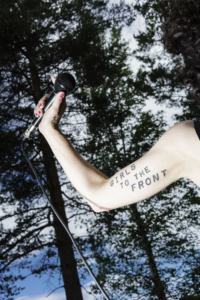
Frida’s coughing and showing her shin with the same tattoo on it.
Cecilia: Yeah Frida also has it. We did it together at the same time. But mine is in a position that you can see it more and people like to shoot it. It’s a riotgirl saying. I think in the 90ies it was Kathleen Hanna who said it the first -she’s from the band bikini kill- and it’s a feminist quote that say girls should be -yeah- in the front. It’s not only a male society. So that’s what it is, it’s a feminist statement.
AFL: Do you think punk and hardcore are male dominated scenes?
Cecilia: I think the music industry i male dominated. I don’t think so, that’s how it is!
Frida: It is!
AFL: What could be the reasons?
Cecilia: The reason is of course the history of human being. I mean male dominate the world, that’s how it looks like in history. And things are changing now. Or not now, things have been changing for a long time. But i mean in Sweden for example, it not even 100 years ago that women can vote. And 100 years ago is not that long ago. Things are happening all the time, but this is how it looks like worldwide, that society was and still is dominated by male.
Håkan: Except for Angela Merkel.
(Some laughing).
Frida: If you see the musicindusty and the record companies, the people in charge are male dominated. And if you see females in the pop business, it’s are certain kind of females you wanna see. They should be like sexy.
Cecilia: Young, thin …
Håkan: He asked for the punk and hardcore scene? If we see it in that terms, is it the same?
Cecilia: It’s more females maybe, but it’s still male dominated.
Frida: Of course, yes. I mean if you see the festivals we’re playing, we are the only females playing. So of course.
AFL: Did you have a hard time in the scene as girls?
Frida: Yes.
Cecilia: I don’t know. I mean of course you notice that you’re a band with females in it. But i think in our case we just do our music and that did not matter that much.
AFL: What are your favorite female fronted bands?
Cecilia: Patti Smith will always be my heroin.
Frida: I would say the distillers, hole, lunachicks ..
Cecilia: Blondie.
Frida: and we have a lot of good bands in Sweden, too. So there are a lot of great bands out there, but they did not often get the chance to be seen.
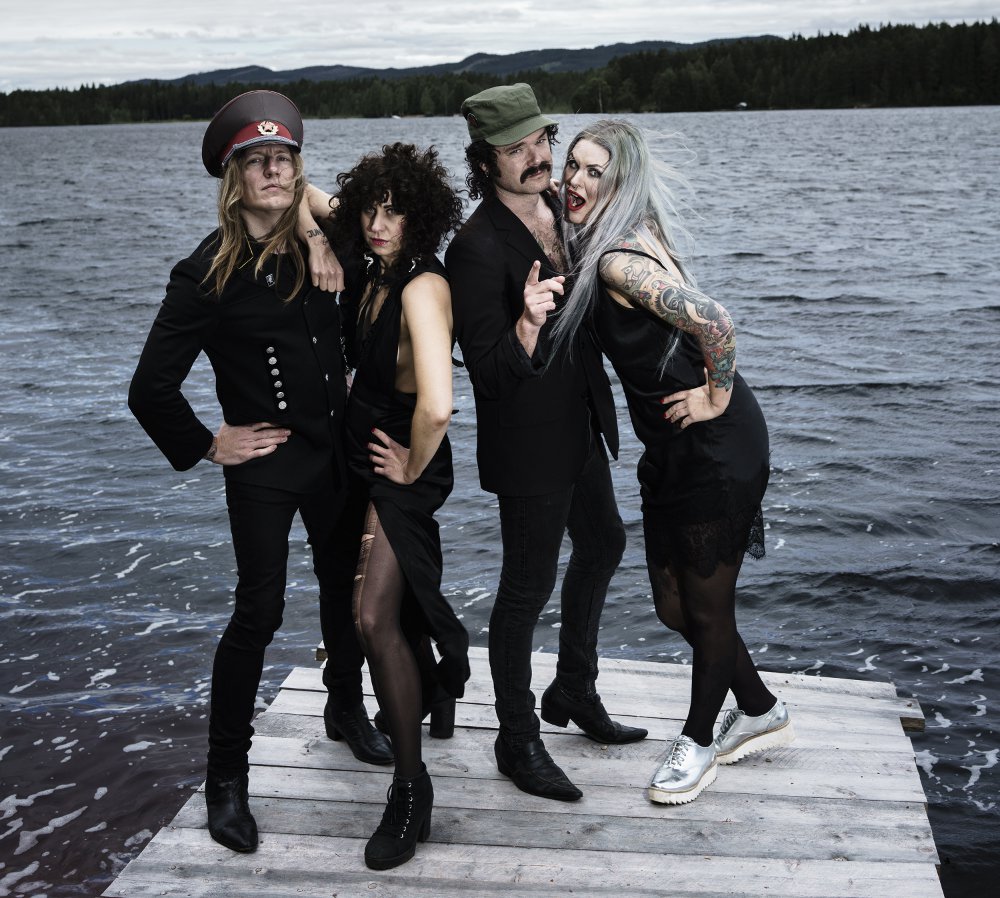
AFL: For me it feels in every country the dissatisfaction and rage about politics and society is growing and people either resign or getting more extreme. How do you think about that?
Niclas: Uhh, thats a tough question. I don’t know. It is a bit like you say. It becomes more extreme, in both ways. The politics now, all over Europe – I would say- it’s quiet normal to have rightwing, fascist thoughts. No one think it’s extreme anymore. When i am for a revolution, they think that i am extreme. But i just want peace and be good to all mankind and nature and animals. Is that extreme?
AFL: No, not at all. But i got your point. If you look at society people are getting more into the right wing?
Niclas: Because it’s easy. Not for me. But its about people who are into politics not that interested and they think everything they read is true. I don’t say that all media is corrupt, because it’s not. Lot of people media is very easy bought -i think- and they don’t tell the whole picture at all. For example; if they do a tv show-trip or something to Cuba or an other socialist country, they only show the wrong parts. They never show what they did good and it’s always like that in our western society and that sucks.
AFL: So you think media try to control people or want to lead them in a direction?
Niclas: Yeah. Not in whole, but partly yes.
AFL: Is there anything that musicians can or should do against it?
Cecilia: No, i mean if you’re a musician you’re a musician and not politician.
Niclas: But we do it all night anyways.
Cecilia: Yes. If you have the power to somehow influence people, you should. But this works in many different layers, because there is also musicians that have a fucked-up agenda and they can also influence people. So i don’t know. I think it’s a little bit tricky somehow. Because music makes people happy, you wanna dance, you’re in a party mood and then – if you’re on stage- you can do and say pretty much what you want to. And sometimes the crowd might not even react to what you said, that’s a little bit dangerous.
Niclas: Another thing is that we actually, of course we do it for the fun, we love playing, but if we get the chance to say something, why shouldn’t we? We actually sometimes get emails or on Facebook that people say: thank you for the lyrics, it really changes my mind. So it’s not all bullshit. I think music is so strong, as a form of expression.
Frida: But there are always people who don’t care about the message, they just want to party.
AFL: If you could change three things in the world, what would it be?
Cecilia: Poverty, war and equality between every human being.
Niclas: I’ll put my sign on that.
Frida: I would vote for you cecilia.
AFL: Is there a special place or festival you would play at?
Frida: We always like to go to cuba.
Cecilia: We were invited to Punk Rock Bowling this year, but we couldn’t do it. That would have been fun.
Frida: Yeah that’s in Las Vegas, that would have been fun. Baboon show goes to Vegas.
Cecilia: They’ll not gonna let us in, but at least we could try. (Laughing)
AFL: Thank you for the interview!




